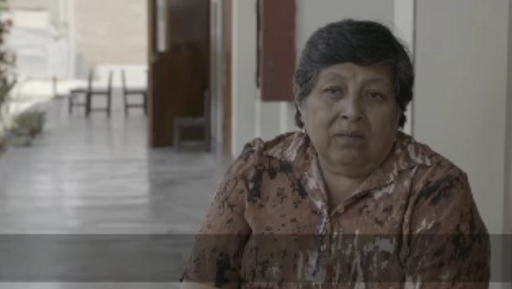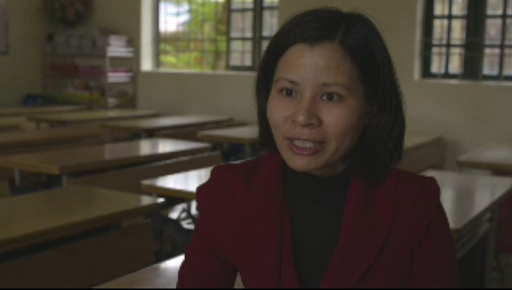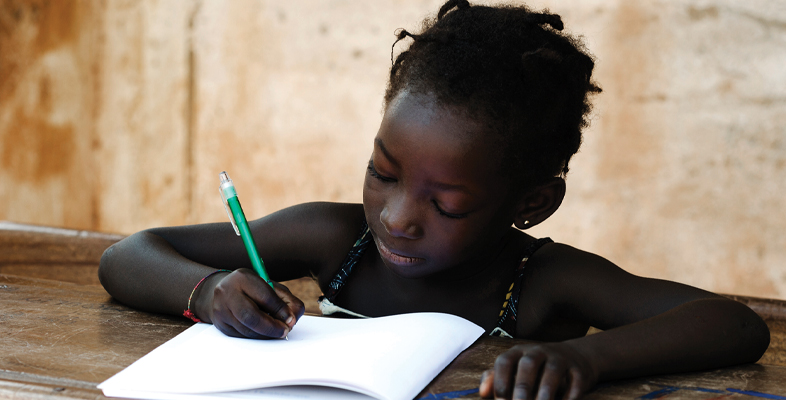4.3 Teachers on teaching
In this activity you will hear from three primary school teachers in different countries. At the end of the interviews, you will make a comparison of their ideas and experiences.
Activity 7
Lucy Conde is a teacher with over 30 years of experience. As you watch the following 10-minute video, think about the areas that appear to be most important to Lucy.

Transcript: Video 3: Lucy Conde
TEXT ON SCREEN (TRANSLATION)
I’ve been a teacher since 1985 when I graduated from the Superior Institute of Education in Chincha. I teach children aged 6, 7, 9, 10 and 11 years old. When I qualified as a primary teacher I had just got married. I didn’t work for a year and dedicated that time to my son. After that I did supply work and took two short contracts. One was to this school, in September 1988, covering a period of leave. I then took a risk by asking the regional council to be assigned as a permanent teacher to this specific school, where I had worked. And so I was named an official teacher here at the end of December 1988. I started working here the following April as a Year 1 teacher. In the past the school buildings were built from Adobe or mudbrick. But after the 2007 earthquake it was all replaced with the help of two NGOs, ‘The Spanish Red Cross’ and ‘Telefonica Espanola’. They changed the entire structure, made everything from new because after the earthquake we were teaching in wooden huts. At that time we were also helped by a local businessman, to build temporary classrooms in the yard. Then the Civil Defence decided to take it all down and the necessary steps were taken to permanently rebuild the school with the help of the two NGOs. All out classes have around 28 to 30 pupils. Sometimes we go up to 34 or 35 children in a class. Quite often the Headteacher says we don’t have vacancies, but then she asks the teachers if we are willing to take on a new child and we decide that we can. We always try to give each student proper care and attention. Primary teachers need to be like encyclopedias because we teach many different subjects, but here, we put an emphasis on maths skills and communication, especially communication. We make sure that the children are able to write and speak properly. I really like teaching communication and maths: they go side by side. Every year I try to learn new techniques and strategies to use in the classroom. I enjoy being close to the children - being with them and the care and protection we can offer them. Often a child looks for someone that can protect them, they want to feel loved, maybe that’s missing for them. In a similar way that we defend our children at home, we defend our children in school, like lions. This is how I feel, I love my children a lot. I like them to be well-mannered and respectful and I look to set an excellent example so they learn from it and develop good values. Our aim is to educate the child fully, in an integral way so he understands himself, and can then get to know others. If a child knows and loves himself, he will love others and want to give to others. I think for a child to grow and to be a good person, you have to get him to know, accept and love himself, then he can begin to grasp everything else. I hope that in the future my pupils become good people for society, for their families and for the country. They are … how can I explain it? Each parent expects good things from their children, something better. Here most parents work in agriculture and they don’t want that for their children. They want them to be professional, to move to different places and serve their country. They are the future, our hope. Few parents take part in their children’s schooling. Many of them work all day, from very early to 5pm. They make breakfast really early for their children, but frequently children come to school without having had breakfast or even combing their hair. Fortunately the government provides breakfast for them at school. Most of the children come to school looking forward to being fed. Some hard working parents just don’t have the time to prepare meals for their children. Sometimes the parents can be a bit distant from their children. We get help from the local council and also a foundation called La Calera, run by a lady called Beatriz, who used to come here herself. Now she has left us in the hands of the foundation that continues to help us. After the earthquake, when the school was rebuilt we had help from a company called Cargill who provided the breakfasts. Today we get support from the National School Feeding Programme, who give us eggs and help provide a tasty breakfast for the children. Cargill still help with Christmas parties; they set up a show and bring along chocolate and presents. At the moment Peru is going through a difficult period with a lot of child delinquency, and that’s what we want to prevent. Usually it’s not the fault of the schools but there are many broken families that lead to children growing up alone without support. Teachers can’t do everything. It would be great if we were magicians that could go home with every child, but we can’t, we have our own responsibilities at home too.
Discussion
Are you surprised that her focus appears to be on aspects other than teaching and learning? She talks about children coming to school for love and protection, and that the purpose of primary education is to teach children to love themselves.
Lucy also mentions the importance of children being sufficiently nourished in order to learn well. This isn’t just an issue in low-income countries. While teachers need to know a great deal about a lot of subjects, what Lucy emphasises is that successful teaching is much more than just standing in front of a class of students.
Activity 8
As you watch and read about Pham Thi Vi’s experiences and perspectives, observe how she uses terminology like ‘methodology’ to explain her work. Listen as she explains the length of her teacher training programme and how her current school was also her training school, how long she spends in school and the time she starts her day.

Transcript: Video 4: Pham Thi Vi
TEXT ON SCREEN (TRANSLATION)
My name is Pham Thi Vi. I am 38 years old. I teach class 1A at Ngoc Lam primary school, in Hanoi City, Long Bien province. I have been teaching for 16 years, since 2000, at this school. In my grade 1 class, there are 51 students in all. I teach the basic subjects, such as Maths, Vietnamese, moral education, social science and handcrafting. I am also responsible for weekly class meetings, extra curriculum activities and some activities in other classes. To be honest, my favourite subject changes depending on the lesson and time. Generally the current teaching methodology consists of converting various subjects into educational activities. I particularly enjoy teaching moral education. Maths teaches students how to think logically, Vietnamese evokes the love of words and the students’ mother tongue. Social science is about understanding life around us, but moral education is the one subject that can be integrated into all the other subjects to help develop the students’ love of the subject, the country, nature, people, the proper way to behave and to become a good human being. Moral education is generally the subject that we enjoy the most in our teaching careers. I finished high school in 1996 and then applied to the primary education department. I started my training in this school the same year and I graduated in 2000. Since then I have been working in primary schools. I teach grade 1 students and have done so for 16 years. In Vietnam many of our first grade students want to become teachers in the future. Becoming a teacher allowed me to achieve my dream from a little girl especially a primary school teacher teaching first grade students. At this age, the students are at their most natural and unspoilt. Being a teacher, the most interesting thing for me is that I can perform three different roles, as their mother, their teacher, and their friend. I love sharing sadness and happiness with my beloved students. The main purpose of primary education is to establish three elements for the students: the first is the most basic knowledge they need when they enter secondary school. Secondly, we try to develop students’ skills and lastly to nurture their moral qualities. When I teach my students, acting as their mother, their teacher and friend, I want my children to grow up well and achieve two things. Firstly, to have a loving heart to appreciate the beauty of nature. Secondly, to have well-developed thinking. These are two things that I really want my children to have. These will help them to grow up and start working and achieving in their lives. In Vietnam, children normally leave school after they finish grade 12, at 18 years of age. If they study hard and pass the entrance exam to university, they can continue to study. If not, when they are 18, they can enrol at vocational schools and find work in firms, manufacturing companies and so on. In Vietnam the contribution from different organisations, such as parents groups or local committees is very important. Apart from the school, parents and the local community also support us by providing furniture if they can afford it. On special occasions local committees also show their encouragement and support for the teachers and the students. They help to improve and maintain school safety and security around the school. Parent groups help the teachers a lot, also providing equipment for the children. They also take part in educating the children, coordinating with the teachers in case there is any problem with the child - it’s always a joint effort! We work five days each week from Monday to Friday. Saturdays and Sundays are days off so we can prepare lesson plans or spend time with our families. I work an eight-hour day, but if there’s work to do we come in earlier and leave late. Teachers must arrive at school 15 minutes before the start of classes so we need to be here by 7:45. But most of us arrive much earlier, at 7:00 or 7:15 - we are happy to do this if it helps our children. We might have preparation or planning work to do. Because grade 1 students are very young, we come to school early to welcome them and check they are OK. Are their clothes warm enough for the winter, have they opened the windows to get some fresh air in, or do their cups need washing up? Some days are busier than other before school starts. At lunch-time in primary schools we need to manage the children’s meals, so at the end of lessons the majority of the teachers will serve food to the children and look after them. We sit with them whilst they’re eating. After they’ve finished their meals, the teachers can have our lunch with the children. After lunch, we help them have a short nap before lessons start again.
Activity 9
In Germany, teachers spend five years studying a degree subject and a further two years learning to teach. Listen to Birgit talking about her experiences of teaching and compare and contrast her comments with those of Lucy and Pham Thi Vi.
Transcript: Audio 3: Birgit Gedicke
BIRGIT GEDICKE
My name is Birgit Gedicke. I’m an English and German teacher at Roter Hahn Schule in Lubeck Germany.
I think that they are very concentrated in listening. Listening comprehension is a very important point. I think that the children like to listen to the English language. They are used to it by songs and they use it for games, and I think they like it. And yah, I think therefore this is the best for them to have it very early, these lessons.
I don’t see any problems by teaching children when they are so young in English. For me it’s important that they are very young because they learn very quickly. They have a better ear to understand the English language. They get used to it very early and they get used to the listening concentration. And I think this is a good thing for them.
I try to speak as much English as I can with them. I avoid to translate. I show a lot. I use pictures. We used lots of TPR so that the children do something by speaking and it should be something that is used every day, things they do every day. So they are topics which come from their normal lives. And yah, I think this is what is very important, that you have topics which the children like.
I started reading and writing a little bit later, the beginning of the second form. In the first class we did a lot of talking and acting, acting out, singing, playing games. And starting with Class 2 I started showing them the words and started to write down some little sentences. And now in Class 3 they really can write some little texts in English.
I want them to be sure that they understand everything, all the most important things. And when I have a special aim for the lesson I want them to get this aim, to reach this aim so I can be sure that they reach this aim I have in my mind. So I want them to speak mostly in English if it’s possible but sometimes they must change in to German so that they can ask me questions they can’t ask in English. They’re not able to, the words they don’t know. And it’s speaking about problems and sometimes about feelings, and this is what they can’t do in English so very well.
I think the children are very relaxed to know that they can switch over into German if it’s possible or if they have to, and if they don’t know how to explain it in English, but they try to do it in English if it’s possible for them.
I try to use it in all subjects, English. I try to say what they have to do, what is the next step. I try to do that in English, to say that in English. Mostly the children know what I want from them. But some things I must do in German because it’s too complicated. For example, when there are special problems I have to clear with the children when they had a quarrel, I do that in German. So that I’m sure that they understand the problem and how to handle it.
The children love learning English. They are very proud of doing it. And they are very proud that they understand special texts, for example, in songs. And that they feel that there is a progress, that they are getting better and understand more than in the first grade. I think they like it very much, yah.
Outside the school they are looking for English words. Sometimes they come back the next day and say, oh I saw on the internet this word, that word, can you translate it. Or they have special t-shirts. There are some sentences on their t-shirts and they want to know the meaning of the sentence or the words. This is the normal life. We live with English here in Germany, in all surroundings and I think this is why children see that it is so important to learn English. And they always come and ask me questions about English words, mmm.
I think that globalisation is so normal for us. For example, when you are travelling or there is a tourist downtown, people talk in English. And I think that in our normal lives English is a very important language here in Europe. So I think that they will use it very often, especially when they are adults. They know how to ask a question or how to answer a question when they meet persons they don’t know and they have another language so they can talk to them.
I think the job market is a very important fact. Nowadays I think you must use English in so many jobs. I think of computer expressions or special handouts they have. I think they will use it very often in other jobs, yes.
For me it’s so much fun to teach English in primary school beginning with the first class. Because I think the children are free of anything. They are not shy. They try to do it without thinking. And, yes, they are spontaneous and they do it without thinking what they are doing and therefore they do it very well and learn it very quickly.
Discussion
Did you notice similarities in the way that Birgit spoke about teaching compared to Lucy and Pham Thi Vi, or maybe you noticed some differences? For instance, Birgit comments on the importance of pupils learning more than one language and about the success the children enjoy when they can speak in a new language. The three teachers have different backgrounds and they all took different pathways into teaching. Birgit works in a much better resourced environment than Lucy and Pham Thi Vi, and Birgit has had many more years of formal education.
